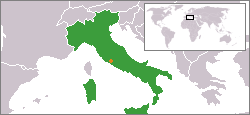Holy See–Italy relations: Difference between revisions
m Bot: Migrating 3 interwiki links, now provided by Wikidata on d:q3932303 |
m WP:CHECKWIKI error fixes - Replaced endash with hyphen in sortkey per WP:MCSTJR using AWB (9100) |
||
| Line 6: | Line 6: | ||
Relations with the Kingdom of Italy were difficult during the papacies of [[Pius IX]] and [[Leo XIII]], who had to endure the status of [[prisoner of the Vatican]] after the [[capture of Rome]]. Leo XIII forbade Christians from participating in elections and accused the Italian state of being controlled by [[freemasonry|freemasons]]. |
Relations with the Kingdom of Italy were difficult during the papacies of [[Pius IX]] and [[Leo XIII]], who had to endure the status of [[prisoner of the Vatican]] after the [[capture of Rome]]. Leo XIII forbade Christians from participating in elections and accused the Italian state of being controlled by [[freemasonry|freemasons]]. |
||
It was only under [[Pius XI]] that the [[Lateran Treaty]] was signed, establishing the [[Vatican City|State of Vatican City]], allowing for greater papal autonomy. Under [[Pius XII]] and [[Paul VI]], [[Christian Democracy]] parties thrived and had great influence on Italian politics. The pope is recognized as a ''kingmaker'' in Italian politics, as demonstrated with the papal influence in the rivalry between Silvio Berlusconi and Romano Prodi.{{ |
It was only under [[Pius XI]] that the [[Lateran Treaty]] was signed, establishing the [[Vatican City|State of Vatican City]], allowing for greater papal autonomy. Under [[Pius XII]] and [[Paul VI]], [[Christian Democracy]] parties thrived and had great influence on Italian politics. The pope is recognized as a ''kingmaker'' in Italian politics, as demonstrated with the papal influence in the rivalry between Silvio Berlusconi and Romano Prodi.{{Citation needed|date=June 2009}} |
||
== Diplomatic Legations to the Vatican in Italy == |
== Diplomatic Legations to the Vatican in Italy == |
||
| Line 44: | Line 44: | ||
{{Foreign relations of the Holy See}} |
{{Foreign relations of the Holy See}} |
||
{{Foreign relations of Italy}} |
{{Foreign relations of Italy}} |
||
{{DEFAULTSORT:Holy See-Italy relations}} |
|||
[[Category:Holy See–Italy relations| ]] |
[[Category:Holy See–Italy relations| ]] |
||
Revision as of 19:03, 20 April 2013
 | |
Italy |
Holy See |
|---|---|
Holy See–Italy relations refers to the diplomatic relations between the Holy See, which is sovereign over the Vatican City, and the Italian Republic.
History
Relations with the Kingdom of Italy were difficult during the papacies of Pius IX and Leo XIII, who had to endure the status of prisoner of the Vatican after the capture of Rome. Leo XIII forbade Christians from participating in elections and accused the Italian state of being controlled by freemasons.
It was only under Pius XI that the Lateran Treaty was signed, establishing the State of Vatican City, allowing for greater papal autonomy. Under Pius XII and Paul VI, Christian Democracy parties thrived and had great influence on Italian politics. The pope is recognized as a kingmaker in Italian politics, as demonstrated with the papal influence in the rivalry between Silvio Berlusconi and Romano Prodi.[citation needed]
Diplomatic Legations to the Vatican in Italy
Due to the size of the Vatican City State, embassies accredited to the Holy See are based on Italian territory. Treaties signed between Italy and the Vatican City State permit such embassages. The Embassy of Italy to the Holy See is unique amongst foreign embassages in that it is the only embassy based on its home territory.
The Holy See maintains formal diplomatic relations with 176 sovereign states, the European Union, and the Order of Malta; 69 of the diplomatic missions accredited to the Holy See are situated in Rome, though those countries then have two embassies in the same city, since, by agreement between the Holy See and Italy, the same person cannot be accredited simultaneously to both.
This is shown clearly by the fact that Italy recognizes the People's Republic of China, and as such, the PRC Embassy to Italy is in Rome. However, the Vatican City State recognizes the Republic of China (commonly known as "Taiwan"), and as such, the ROC Embassy to the Holy See is also in Rome. As Italy was the first country to recognize the Holy See as a sovereign nation, their embassy was the first one established.
Apostolic Nuncios to Italy and San Marino
The nunciature to Italy is currently held by Archbishop Adriano Bernardini. Past nuncios since 1929 were:
- Francesco Borgongini Duca (30 June 1929 - 12 January 1953)
- Giuseppe Fietta (26 January 1953 - 15 December 1958)
- Carlo Grano (15 December 1958 - 26 June 1967)
- Egano Righi-Lambertini (8 July 1967 - 23 April 1969)
- Romolo Carboni (26 April 1969 - 19 April 1986)
- Luigi Poggi (19 April 1986 - 9 April 1992)
- Carlo Furno (15 April 1992 - 26 November 1994)
- Francesco Colasuonno (12 November 1994 - 21 February 1998)
- Andrea Cordero Lanza di Montezemolo (7 March 1998 - 17 April 2001 )
- Paolo Romeo (17 April 2001 - 19 December 2006)
- Giuseppe Bertello (11 January 2007 - 1 October 2011)
- Adriano Bernardini (15 November 2011 - )


